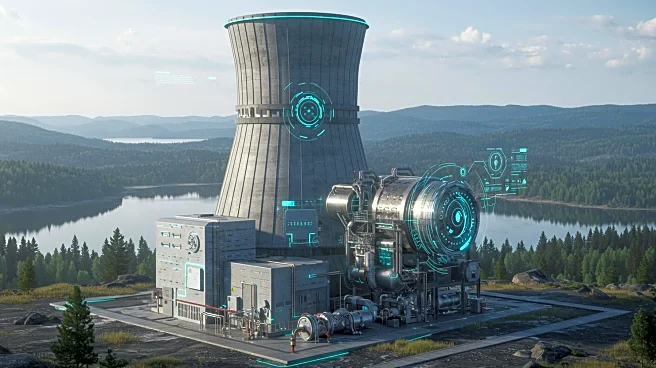What's Happening?
Swedish utility Vattenfall has narrowed its selection of small modular reactor (SMR) suppliers to two finalists: GE Vernova's BWRX-300 and Rolls-Royce SMR. This decision is part of a plan to construct new nuclear capacity adjacent to the Ringhals plant site on Sweden's Värö Peninsula. The project aims to meet rising electricity demand, bolster energy security, and advance Sweden's net-zero targets. The selection process began in 2024 with 75 potential suppliers and was narrowed to four candidates, including designs from Westinghouse and Électricité de France. Vattenfall plans to build either five BWRX-300 SMRs or three Rolls-Royce SMRs, providing a total output of 1,500 MWe. The utility is also considering building another 1 GW near Ringhals 1 and 2.
Why It's Important?
The selection of SMR suppliers by Vattenfall marks a significant step in Sweden's nuclear policy, reflecting a broader European recognition of nuclear power's role in decarbonization. The project could become Sweden's first new nuclear build in over 40 years, contributing to the country's energy security and climate goals. SMRs offer advantages such as lower investment costs, reduced workforce needs, and manageable logistics, which can mitigate risks of delays and increased costs. The decision aligns with Sweden's removal of limits on nuclear reactor numbers and its investment in fossil-free electricity expansion.
What's Next?
Vattenfall will continue negotiations with the two finalists and submit an application for state risk-sharing. The company is preparing applications under Sweden's Environmental Code and Nuclear Activities Act, while collaborating with the Industrikraft consortium for potential co-investment. The consortium includes 17 leading Swedish industrial companies. Vattenfall aims to finalize supplier selection and establish financing and risk-sharing models with the state. The project is expected to lay the foundation for more nuclear power projects in Sweden.
Beyond the Headlines
The choice of SMRs reflects site constraints on the Värö Peninsula, which hosts the Ringhals nuclear power plant. SMRs have less impact on existing operations due to fewer construction workers and less construction area. The modular approach allows for simplified design and lower costs, with potential for series construction to transfer lessons from one unit to the next. The project could influence future nuclear developments in Europe, as SMRs gain traction through strategic partnerships and government support.









